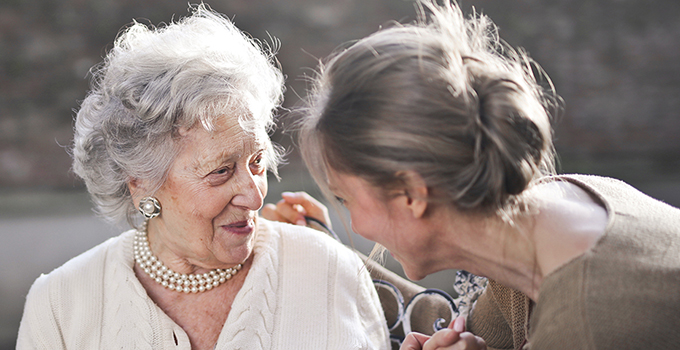
What causes grey hair?
In this blog we'll tell you what causes grey hair, where your hair colour comes from and what influences the age at which you'll turn grey. Did you know that white people turn grey the quickest? After that is people with Asian heritage. People of colour turn grey the latest in life. Professors of the University of Stanford discovered that 50% of the population has 50% grey hair by the time they're 50 years old. However common it may be, grey hairs can surprise everyone. What causes grey hair and do we have any control over it?
How does your hair get its colour?
When looking into grey hair colour, you'll have to tackle this question first. The hair follicles that grow your hair contain cells called 'melancoytes'. These melancoytes produce pigment, commonly known as 'melatonin'. This pigments control the colour of your hair. Generally speaking, the more melanin you have, the darker your hair. The opposite is also true. Melatonin also has an influence on the agility of your hair. That's why grey hair generally is a little dryer and harder, and why it curls more.
How and why do you get grey hair?
Your hair follicles produce less pigment as you turn older. When they stop producing pigment, your hair becomes colourless. Colourless is hair is always white. So technically, grey hair doesn't exist! Your hair looks grey because there's white hairs mixed with your coloured hair. The amount of white hairs you have influences how 'grey' your hair looks.
While one person turns grey in their twenties, the other may turn grey at old age. Such a thing is hereditary. The average male gets their first grey hair when he's around 30 years old, while women are around 50 when getting their first grey hair. Next to genetics, your racial background also plays a role in when you turn grey.
Turning grey more quickly because of hair loss
People often say that stress causes grey hair. That's false! Once a hair has grown from a hair follicle, it keeps the same colour (unless you dye it) and will keep growing in that same colour. A hair can't change colours, so also not because of stress. Stress can, however, cause extra hair loss. And once you've started turning grey, there's a higher chance those hairs grow back grey. So in a sense, stress can cause the process of turning grey to speed up but it won't make you grow new grey hair.
Telogen Effluvium
If someone stresses much over a longer period of time, we can often see that an abnormally big amount of hair follicles 'goes to sleep'. When this happens, these hairs will stop growing and will eventually let loose from your skin/hair follicles. This condition will make your hair fall out three times more quickly than it usually would. The hair does grow back. But once you've already started growing grey hair, the chances of growing more grey hair will have increased. The stress will make you replace hair more quickly.
Alopecia Areata
Another form of hair loss caused by stress is alopecia areata. With this condition, the immunesystem weakens in the hair follicles, causing more hair loss.
As you can see, once you've started growing a few grey hairs, hair loss can be a catalyst for growing more grey hair. That's why releasing stress and therefore hair loss will make you keep your nice colour for longer!
As well as stress, the biggest causes of hair loss that you can control are as follows:
- hypothyroidism: a thyroid disorder in which your body produces too many or too few hormones. It's possible to get medication for this.
vitamin deficiency: are you deficient in zinc or vitamin B? Chances are you suffer from hair loss. Smokers in particular are at risk of vitamin B12 deficiency.
too much styling: If you expose your hair to heat and chemicals too often, it can weaken your hair so much that it breaks off or falls out.
Is it possible to prevent grey hair?
Next to a healthy lifestyle and good nutrition, there's not much you can do against grey hair. There's supplements against grey hair, but there's no scientficical proof that these actually work. Because grey hair is unpreventable, many people dye their hair.
Dyeing grey hair
Grey hair is a bit more difficult to dye than hair that still contains colour. The greyer your hair, the worse the coverage the dye will have on your hair. Dye that covers grey hair therefore often contains a lot of ammonia, sulfates, parabens and ppd which make for better coverage. The downside to this is that these dyes are very aggressive and are bad for the health of your hair. Natural hair dye does not have good coverage on grey hair. That's where WECOLOUR comes in. WECOLOUR hair dye has been especially developed to have good coverage on grey hair with ingredients as mild and healthy as possible. We've replaced as many as possible harsh chemicals with milder alternatives. These won't damage your hair as much, leaving the hair healthy and colourful. Is your hair difficult to dye? You'll get the best coverage with a natural shade. Natural shades are the shades with a .0 behind the first colour number. Golden shades, ending in .3, also have very good coverage on grey hair.
When using WECOLOUR hair dye, you can be sure that the hair dye is as pure as possible and to (almost) always get good coverage on your grey hair. The hair colour advice tool can help you with finding the right colour for your hair. In some cases you'll need a darker shade than you actually would use in the first place. You could also get a different shade or give your hair a special treatment before you dye it if it doesn't work right away. If that doesn't work, we can send you a replacement dye for free. You're always welcome to ask any questions to one of our dye specialists. We would love to help you!
In most cases, you can't control when or how you turn grey. But with WECOLOUR, it is possible to dye your hair in a healthy way with good coverage.
